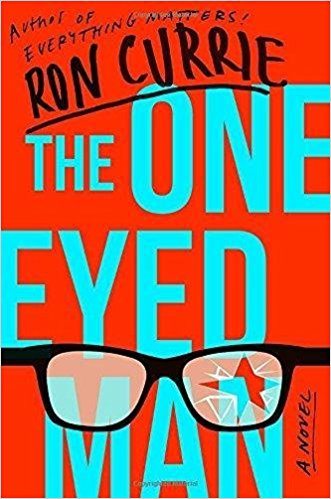By Jennifer Dwight | @jennifer_dwight
Author and satirist, Ron Currie recently entertained his following with tales of his newly-released novel, The One-Eyed Man (Penguin Rand House 2017) and its curious protagonist, “K,” who is a sort of modern-day Diogenes. K., a grieving widower, who has lost the faculty of telling lies in any form, if he ever had it, and, consequently, finds himself in one pickle after another. Fame finds him, alas, replete with a media frenzy and cataclysmic consequences. Why? Perhaps because “Mankind cannot bear very much reality,” as T.S. Eliot famously wrote.
But Ron Currie can. He thirsts for full frontal reality and believes he is not alone. An impassioned writer on the topic of current events and the dire need for dialogue among people with stark polarities in viewpoint, his message fell on welcome ears at Book Passage in the San Francisco Ferry Building. He has the rare gift of writing wildly creative fiction, full of quirky characters whose antics keep readers on the edge of their seats simultaneously horror-struck and laughing out loud.
Currie, now 42, is a self-taught writer and a self-made man, who says writing, reading, and working out are what keep him sane. His humble origins arose in a dying mill town in central Maine where he was “a poor rural White kid,” smitten by reading and writing at an early age as an escape from difficult financial circumstances. He wrote steadily through high school and describes himself as a nerd who then entered Clemson University–for one semester. He decided that college wouldn’t help him go where he “wanted to go,” and dropped out. He supported himself as a short-order cook, writing and reading voraciously in his off hours. At age 25, he regretted his decision to leave college and vowed to abandon writing as his objective if he didn’t sell any of his work by his next birthday. Fate smiled. Two weeks before turning 26, he sold a story.
Currie’s first book, God Is Dead (Viking, 2007) is a collection of chapter-length stories describing a world where God has come to earth in the form of a Dinka Woman, “to observe firsthand the armed conflict between Sudan’s Islamic government and the Christian Nuer tribe in the south” – until She is eaten by dogs in the process. (See “A Review of God Is Dead,” The Believer, Sept. 2007). The book was published to much critical acclaim for its daring mix of dark humor and sincerity, garnering comparisons to Kurt Vonnegut. It was named a Notable Book of 2007 by the San Francisco Chronicle. Currie received the Young Lions Fiction Award from the New York Public Library and the Metcalf Award from the American Academy of Arts & Letters.
Next came his first novel, Everything Matters! (Penguin Group 2009), whose protagonist knows, from the moment of his birth, exactly how and when the world will end. He struggles to understand whether his actions truly matter in the face of the inevitable. A smash hit, the novel received the Alex Award from the American Library Association and appeared on several best-of lists for 2009 (Los Angeles Times, National Public Radio, and on Amazon.com, to name a few). Janet Maslin, writing for The New York Times (April 1, 2013) called Currie “a startlingly talented writer…who writes in a tenderly mordant voice….Above all, Everything Matters radiates writerly confidence.”
As he also does in person, Currie exudes confidence while also seeming devoid of artifice or pretention. He is compelled to unearth “the truth.” He devoutly believes that human beings in this highly-polarized world long for it, despite evidence to the contrary, which he is only too willing to highlight in all its hilarious absurdity.
His third book, Flimsy Little Plastic Miracles (Viking 2013) was praised by The New Yorker as his “most grounded work yet and perhaps his “darkest.” “Anything does seem possible in Currie’s fantastical fiction…[which] explores the deeper meanings things gain after they’re gone.” (April 1, 2013.) Called “a tour de force of imagination” (on Amazon) the author readily admits that much of his work comes from his own experience.
While in the middle of writing his fourth novel (not yet published), Currie was washing his hands one day. He happened to read the label on the bottle of liquid hand soap. (He explained that he is a compulsive reader of absolutely everything that crosses his path.) Inspiration struck when he read the list of ingredients listed there, and The One-Eyed Man was conceived. It took on a life of its own, forcing him to set aside the novel he was in the midst of writing. The title is derived from a quotation from the 15th Century theologian Erasmus of Rotterdam: “In the land of the blind, the one-eyed man is king.” The book is dedicated to “My fellow Americans”– and after you read it, you will understand why. (He’s now back to working on the novel that was interrupted by hand washing.)

Currie is a diligent writer whose work has appeared in many journals, newspapers, and on-line publications. Many are archived on his website. He follows a routine that balances reading, writing, and working out, which accounts for his unmistakable physical fitness and the high quality of his output as a writer. He writes daily in several blocks of time, and only on a computer, without an outline. His stated driving force is being “tired of years of being subjected to b.s.” and his conviction that people are hungry for true dialog. Whether or not that is true, they are definitely hungry for Ron Currie’s fiction and its combination of comic relief and biting social commentary.

JENNIFER DWIGHT is a San Francisco Bay Area author. Her suspense novel, The Tolling of Mercedes Bell (She Writes Press 2016) has won 9 literary awards from the 2016 Indie Next Generation Book Awards, The USA Best Book Awards, The Beverly Hills Book Awards, and the 2017 Reader Views Literary Awards in the categories of Suspense, Thriller, Mystery, General Fiction, Literary Fiction, Legal Thriller, President’s Choice, and Women’s Fiction.”

